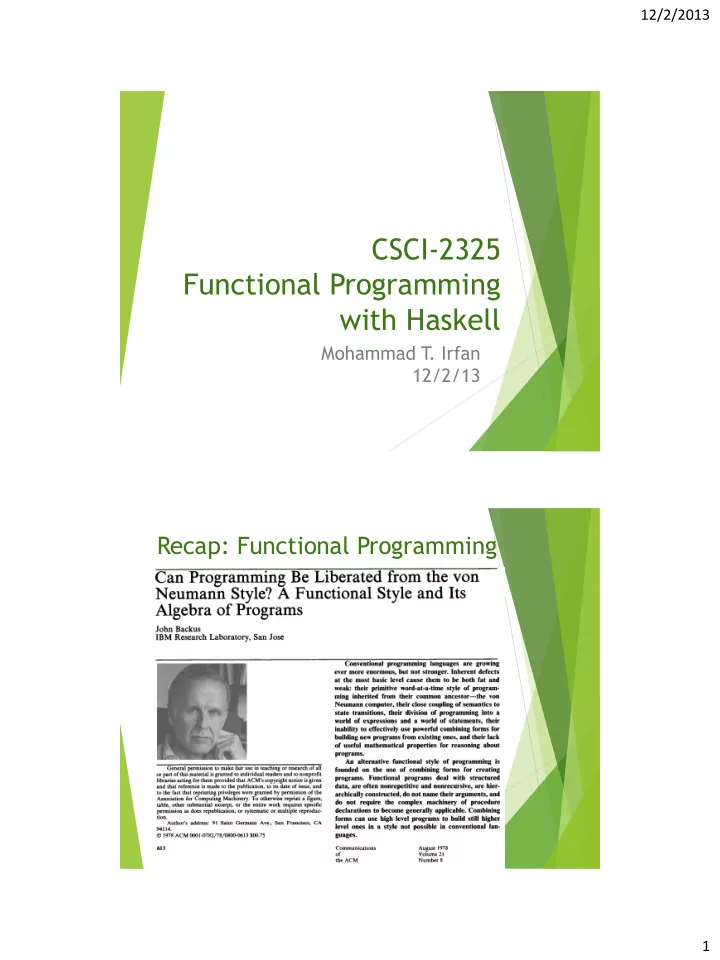

12/2/2013 CSCI-2325 Functional Programming with Haskell Mohammad T . Irfan 12/2/13 Recap: Functional Programming 1
12/2/2013 Functional Programming Mimic mathematical functions No variables No assignment statements How about iterative statement? Alternative? Context-independent Referential transparency Interesting facts: LISP and LISP Machine John McCarthy Knight machine LISP(1958) (1980s) 2
12/2/2013 Core concept: λ calculus Alonzo Church (1941) λ expression Parameters and mapping of a function No name Example λ (x) x * x * x Evaluation: ( λ (x) x * x * x)(2) produces 8 Haskell 3
12/2/2013 Resources Installation http://www.haskell.org/platform/ Haskell (GHCi) commands http://www.haskell.org/ghc/docs/7.4.1/html/users_gui de/ghci-commands.html Learning Best book: Miran Lipovaca’s Learn You a Haskell for Great Good! http://learnyouahaskell.com/ (free online version) Useful how-to page http://www.haskell.org/haskellwiki/Category:How_to Other resources: http://www.haskell.org/haskellwiki/Learning_Haskell 4
12/2/2013 Haskell Warm-up exercises Elementary functions Make a myFunctions.hs file and define the following functions in it doubleMe x = x + x addSquares x y = x*x + y*y Using the terminal go to the folder of that .hs file Execute this command: ghci Load the .hs file :load myFunctions.hs (or, :l myFunctions.hs) Use your functions addSquares 5 10 If you change the .hs file => Execute :r to reload 5
12/2/2013 Recursion – Fibonacci numbers fibonacci n = if n == 0 then 1 else if n == 1 then 1 else if n > 1 then fibonacci (n-1)+fibonacci (n-2) else 0 fib n | n == 0 = 1 | n == 1 = 1 Guard | n > 1 = fib (n-1) + fib (n-2) | otherwise = 0 Recursion – factorial factorial n | n == 0 = 1 | n > 0 = n * factorial (n-1) -- why not factorial n – 1 ? Comment Try this: factorial 100 6
12/2/2013 Recursion – sorting sort [] = [] Empty list sort (head:remainingList) = sort [b | b <- remainingList, b < head] ++ [head] ++ sort [b | b <- remainingList, b >= head] List generator Lists evens = [0, 2 .. 10] In terminal (ghci): let evens = [0, 2 .. 10] evens = [2*x | x <- [0..5] ] Infinite lists allEvens = [0, 2 ..] Are these assignment statements? 7
12/2/2013 Anatomy of a list Two parts head List of the remaining elements (AKA tail) Functions head and tail return these head evens tail evens Joining head and tail by : operator 0 : [2, 4 .. 10] will give [0, 2, 4, 6, 8, 10] Reference http://www.haskell.org/haskellwiki/How_to_work_on_lists More list examples Factors of a number n factors n = [f | f <- [1 .. n], mod n f == 0] Prime numbers primes = primeGen' [2 ..] where primeGen' (p:xs) = p : primeGen' [q | q <- xs, mod q p /= 0] Getting the first 10 prime numbers take 10 primes Lazy evaluation Side note: This is not really the sieve of Eratosthenes http://www.cs.hmc.edu/~oneill/papers/Sieve-JFP .pdf 8
12/2/2013 Recursion vs. iteration Iterative factorial factorial n = product [1 .. n] Iterative sum sum [1 .. 5] Recursive sum recSum [] = 0 recSum (x:xs) = x + recSum xs recSum is polymorphic (Works with any compatible type) n-queens problem queens n = solve n where solve k | k <= 0 = [ [] ] | otherwise = [ h:partial | partial <- solve (k-1), h <- [0..(n-1)], safe h partial] safe h partial = and [ not ( checks h partial i) | i <- [0..(length partial - 1)]] checks h partial i = h == partial!!i || abs(h - partial!!i) == i+1 9
Recommend
More recommend